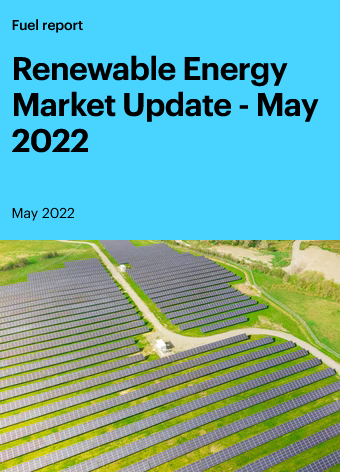by Brianna Crandall — July 14, 2022 — New capacity for generating electricity from solar, wind and other renewables increased to a record level worldwide in 2021 and will grow further this year as governments increasingly seek to take advantage of renewable power’s energy security and climate benefits, according to the International Energy Agency’s (IEA) latest Renewable Energy Market Update.
The world added a record 295 gigawatts of new renewable power capacity in 2021, overcoming supply chain challenges, construction delays and high raw material prices, according to the report. Global capacity additions are expected to rise this year to 320 gigawatts — equivalent to an amount that would come close to meeting the entire electricity demand of Germany or matching the European Union’s (EU) total electricity generation from natural gas. Solar photovoltaic (PV) power is on course to account for 60% of global renewable power growth in 2022, followed by wind and hydropower.
In the European Union, annual additions jumped by almost 30% to 36 gigawatts in 2021, finally exceeding the bloc’s previous record of 35 gigawatts set a decade ago. The additional renewables capacity commissioned for 2022 and 2023 has the potential to significantly reduce the EU’s dependence on Russian gas in the power sector. However, the actual contribution will depend on the success of parallel energy efficiency measures to keep the region’s energy demand in check.
IEA Executive Director Fatih Birol stated:
Energy market developments in recent months — especially in Europe — have proven once again the essential role of renewables in improving energy security, in addition to their well-established effectiveness at reducing emissions. Cutting red tape, accelerating permitting and providing the right incentives for faster deployment of renewables are some of the most important actions governments can take to address today’s energy security and market challenges, while keeping alive the possibility of reaching our international climate goals.
Renewables’ growth so far this year is much faster than initially expected, driven by strong policy support in China, the European Union and Latin America, which are more than compensating for slower than anticipated growth in the United States. The U.S. outlook is clouded by uncertainty over new incentives for wind and solar and by trade actions against solar PV imports from China and Southeast Asia.
Based on today’s policy settings, however, renewable power’s global growth is set to lose momentum next year. In the absence of stronger policies, the amount of renewable power capacity added worldwide is expected to plateau in 2023, as continued progress for solar is offset by a 40% decline in hydropower expansion and little change in wind additions.
While energy markets face a wide range of uncertainties, the strengthened focus by governments on energy security and affordability — particularly in Europe — is building new momentum behind efforts to accelerate the deployment of energy efficiency solutions and renewable energy technologies. The outlook for renewables for 2023 and beyond will therefore depend to a large extent on whether new and stronger policies are introduced and implemented over the next six months.
The current growth in renewable power capacity would be even faster without the current supply chain and logistical challenges. The cost of installing solar PV and wind plants is expected to remain higher than pre-pandemic levels throughout 2022 and 2023 because of elevated commodity and freight prices, reversing a decade of declining costs. However, they remain competitive because prices for natural gas and other fossil fuel alternatives have risen much faster, notes IEA.
Global additions of solar PV capacity are on course to break new records in both this year and next, with the annual market reaching 200 GW in 2023. Solar’s growth in China and India is accelerating, driven by strong policy support for large-scale projects, which can be completed at lower costs than fossil fuel alternatives. In the EU, rooftop solar installations by households and companies are expected to help consumers save money as electricity bills rise.
Policy uncertainties, as well as long and complex permitting regulations, are preventing much faster growth for the wind industry. Having plunged 32% in 2021 after exceptionally high installations in 2020, additions of new onshore wind capacity are expected to recover slightly this year and next.
New additions of offshore wind capacity are set to drop 40% globally in 2022 after having been buoyed last year by a huge jump in China as developers rushed to meet a subsidy deadline. But global additions are still on course to be over 80% higher this year than in 2020. Even with its slower expansion this year, China will surpass Europe at the end of 2022 to become the market with the largest total offshore wind capacity in the world.
Biofuel demand recovered in 2021 from its pandemic lows to reach more than 155 billion liters — near 2019 levels. Demand is expected to keep rising — by 5% in 2022 and 3% in 2023. However, the impacts of Russia’s invasion of Ukraine have contributed to a 20% downward revision of IEA’s previous forecast for biofuel growth in 2022. Since biofuels are blended with gasoline and diesel, much of the downward revision stems from slowing demand for transport, which has been depressed by a combination of factors including growing inflationary pressures, weaker global economic growth, and Covid-related mobility restrictions in China.
IEA’s Renewable Energy Market Update — May 2022 is available to read or download free from the agency’s website.





